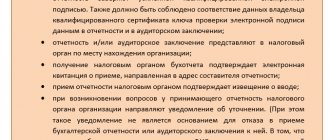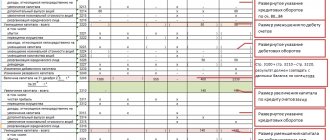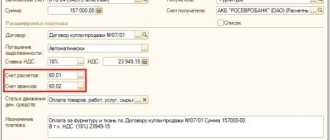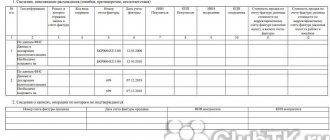There is just over a month left until the submission of the annual financial report and it’s time to talk about how to store financial statements in such a way as to optimize business processes and protect yourself from the risks of violating the law.
The period for submitting annual financial statements is one of the most critical moments in the work of every employee of the accounting department. It is required not only to generate reports, but also to monitor compliance with legal requirements and take into account all the intricacies of accounting and tax accounting.
But it is not enough just to submit the annual accounting report correctly! In order for your accounting documentation to comply with all regulations of the current legislation of the Russian Federation, you also need to comply with the norms and requirements regarding the storage periods for tax and accounting reporting documents.
General information about prescriptions for narcotic and psychotropic substances
A prescription form is a document of strict accountability in which the doctor records the prescription of a drug to the patient, indicating its name, dosage, duration of use, and sealing it with his signature and the seal of the medical organization. The main purpose of a prescription is the unimpeded dispensing of a limited-circulation drug in a pharmacy (medical organization).
A prescription is required for a large list of medications. According to general rules, registration and storage of prescription forms is carried out on the basis of Order of the Ministry of Health of Russia dated January 14, 2019 No. 4n. However, for medicines containing narcotic and psychotropic substances, a special procedure for filling out prescriptions applies. The list of such drugs was approved by Decree of the Government of the Russian Federation dated June 30, 1998 No. 681 (lists II, III).
The legal basis for issuing prescriptions for psychotropic and narcotic substances is Art. 26 of the Federal Law “On Narcotic Drugs and Psychotropic Substances” dated January 8, 1998 No. 3-FZ (hereinafter referred to as Law No. 3-FZ). Here, in particular, it is stated that such prescriptions must be written strictly on special forms approved by the federal executive body in the field of healthcare in agreement with the Ministry of Internal Affairs (clause 2 of Article 26 of Law No. 3-FZ).
Currently, prescriptions for drugs containing narcotic and psychotropic substances from List II, except for transdermal therapeutic systems and drugs containing narcotic drugs in combination with an opioid receptor antagonist, are issued on form No. 107/u-NP. This form was approved by order of the Ministry of Health of Russia dated August 1, 2012 No. 54n (hereinafter referred to as order No. 54n). The same document establishes the procedure for their recording and storage (Appendix 4, hereinafter referred to as the Procedure).
Please note that for some drugs that also contain narcotic and psychotropic substances, prescriptions are written in a different form - No. 148-1/u-88. These include (clauses 1, 3, clause 10 of the order of the Ministry of Health of Russia dated January 14, 2019 No. 4n):
- substances from list II in the form of transdermal therapeutic systems and drugs containing narcotic drugs in combination with an opioid receptor antagonist;
- psychotropic substances from list III;
- individually manufactured medications containing narcotic and psychotropic substances from List II;
- combination medications containing, in addition to small quantities of narcotic drugs, psychotropic substances and their precursors, other pharmacological active substances.
For prescriptions for such medications, Order No. 4n of the Russian Ministry of Health dated January 14, 2019 also established some rules for their recording and storage.
Accounting for prescription forms. Logbook
Prescription forms for prescribing medications containing narcotic and psychotropic substances are received by a medical organization from the Ministry of Health of the Russian Federation in strictly limited quantities according to a specific algorithm in accordance with the organization’s application submitted annually before 01.10.
Accounting for forms involves carefully maintaining a log of prescription forms. Such a journal has very specific requirements both in form and content. In accordance with clause 23 of Appendix No. 3 to Order No. 4n of the Ministry of Health of Russia dated January 14, 2019, recording of prescription forms No. 148-1/u-88 produced by printing is carried out in accounting journals, numbered, laced and sealed with the signature of the head and seal medical organization or the signature of an individual entrepreneur who has a license for medical activities.
The log book of forms 107/u-NP must also be laced, each sheet is numbered, and the total number of sheets is indicated on the last page. It is mandatory to indicate the full name of the medical organization. The journal is certified by the signature of the director and the seal of the medical organization (clause 4 of the Procedure). The responsibility for recording and storing these prescription forms rests with the medical organization that receives these forms from the Ministry of Health of the Russian Federation (clause 2 of the Procedure). This function is directly performed by a responsible employee appointed by order of the head of the medical organization. In addition to the order, it is also necessary to issue a power of attorney for this employee (clause 3 of the Procedure).
As for the contents of the accounting logs, the information in them is presented according to a fairly simple principle: the serial number of the entry, information about received prescription forms (receipt) and information about spent prescription forms (expense) are indicated (clause 5 of the Procedure, clause 25 of Appendix 3 to order No. 4n).
In this case, the “Incoming” column should contain:
- details of the receipt document, including its date;
- number of accepted forms;
- series and number of each form;
- number of forms in each series;
- Full name and signature of the person accepting the forms.
In the “Expense” column the following must be indicated:
- date of issue of forms;
- series and numbers of issued forms;
- the number of forms issued, including those intended for registration at home (only for forms 107/u-NP);
- Full name and signature of the person receiving the forms;
- number of prescription forms issued at home (only for forms 107/u-NP);
- Full name and signature of the person who filled out the prescriptions at home (only for forms 107/u-NP).
In addition, the log must indicate the full name of the responsible employee and his signature. Each time after the forms are issued, their balance must be recorded.
It should be noted that the possibility of issuing prescriptions 107/u-NP for narcotic and psychotropic substances at home is an innovation. This is allowed from 02/09/2020 when providing palliative medical care (Order of the Russian Ministry of Health dated 12/11/2019 No. 1021n). In the prescription register, a note must be made about the issuance of the form specifically for the purpose of registration at home; the fact of discharge is also recorded. Additionally, you can confirm the fact that the prescription was filled out with photo and (or) video materials. They should be included in the journal.
Despite the fairly detailed regulation of the information that must be indicated by the responsible employee in the accounting log, orders No. 4n and No. 54n do not establish any specific form. Judges also point to this when making decisions on bringing medical organizations to administrative responsibility for violations of the rules for recording and storing prescription forms (see, for example, the resolution of the Ingodinsky District Court of the city of Chita, Trans-Baikal Territory No. 5-79/2016 dated April 29, 2016 in case No. 5-79/2016). The main thing is that the journal contains all of the above information.
At the same time, it should be borne in mind that the legislation of a constituent entity of the Russian Federation may establish a similar form. We will find it, for example, in the appendix to the Order of the Moscow Department of Health dated December 11, 2015 No. 1077 “On the procedure for acquisition, transportation, storage...”. She looks like this:
A special commission created specifically for these purposes by a medical organization monitors how prescription forms are registered and whether the entries in the journal correspond to the actual number of forms. Inspections must be carried out at least once a month (clause 9 of the Procedure).
External supervision and control over compliance with the rules for registration and recording of prescriptions is carried out by Roszdravnadzor of the Russian Federation (clause 10 of the Procedure).
Assistance with accounting in the hotel business
This is not the only case that can confuse an accounting employee, for this reason it is important that the hotel accounting specialist is competent in this matter.
Our organization maintains accounting records in various areas of activity and hotel business accounting is no exception.
When maintaining hotel accounting, we pay special attention to such issues as:
- Preparation of primary documents;
- Filing tax and accounting reports;
- Legal support during tax inspections.
We will advise you on the choice of taxation system, because with the most convenient option you will be able to reduce your expenses, which will allow you to make additional investments in your business and attract new clients!
Accounting for reserve stock of prescription forms
Part of the prescription forms issued by the Ministry of Health of the Russian Federation goes into reserve and is stored there in case of an unexpected end to the medical organization’s stock.
The reserve stock of forms is also subject to careful accounting and storage. This function is carried out by the Federal State Budgetary Institution “All-Russian Center for Disaster Medicine “Protection” of the Ministry of Health of the Russian Federation (clause 2 of the Procedure). Accounting and storage occurs according to the same basic rules as in medical organizations: a responsible person is appointed, a power of attorney is drawn up, and a journal is kept.
The issuance of prescription forms from the reserve stock occurs on the basis of a letter signed by the director of the Department of Drug Supply and Regulation of Circulation of Medical Products of the Ministry of Health. The same body exercises control over the activities of the institution “VTsMK “Zashchita” for registration, accounting and storage of reserve stock by conducting scheduled inspections 2 times a year (clause 10.1 of the Procedure). To issue reserve forms, a corresponding application is required (clause 12 of Appendix No. 3 to Order No. 54n).
What are the fundamental features of accounting in the hotel business?
First of all, I would like to say that the main area of activity of the hotel complex is the provision of services. It is quite difficult to reflect services in accounting because they are not tangible, they cannot be accumulated, and for this reason accounting is carried out in a certain way.
Such services include:
- Booking services;
- Paid parking services;
- Medical examinations.
Hotel accounting is also carried out in the following areas:
- Personnel management in the hotel business;
- Catering accounting;
- Costs for material and technical services.
Electronic prescription accounting
Clause 1 Art. 26 of Law No. 3-FZ allows the issuance of prescriptions for narcotic and psychotropic substances not only in the usual paper form, but also in electronic form. This is only possible if several conditions are met simultaneously:
- The legislation of the constituent entity of the Russian Federation has decided to use electronic prescriptions along with paper ones (Clause 4, Article 6 of the Law “On the Circulation of Medicines” dated April 12, 2010 No. 61-FZ).
- The patient or his legal representative agrees to the electronic form of the prescription (clause 3 of article 78 of the law “On the fundamentals of protecting the health of citizens in the Russian Federation” dated November 21, 2011 No. 323-FZ).
- The electronic prescription must be certified by enhanced qualified electronic signatures of the attending physician and the relevant medical organization (paragraph 3, clause 3 of the order Order of the Ministry of Health of Russia dated January 14, 2019 No. 4n).
A medical organization issuing electronic prescriptions must be included in the federal register of medical organizations of the Unified State Health Information System and be connected to the regional health information system. Thus, in fact, accounting for the issuance of such prescription forms should be carried out in this system by maintaining a single register.
Meanwhile, a detailed regulatory framework for issuing electronic prescriptions for narcotic and psychotropic substances, as well as maintaining a register of such prescriptions, is not yet available.
At the intersection of technologies
In reality, the legislation of the Russian Federation currently does not allow full use of the advantages of working with documents only in electronic format.
Therefore, in order, on the one hand, to work within the legal framework, and, on the other hand, to receive all the conveniences from using electronic documents - now most companies work simultaneously with documents in both electronic and paper format. But such an organization of business processes carries the risk of difficulties arising when synchronizing paper and electronic office work. If employees manually create and process accounting and tax reporting documents, the risk of delays and violations in filing reports increases; reporting deadlines may be missed, which, in turn, threatens the company with penalties or even criminal liability.
Outsourcing the management and storage of accounting documents allows you to optimize the document accounting system, preparing documents for reporting is easier and eliminates the risks of violating the law. The presence of a “paper archive - electronic” link allows you to fully appreciate the advantages and convenience of working with documents in electronic format, and at the same time comply with the law regarding the requirements for the availability and storage of paper documents.
Advantages of off-site outsourcing storage of accounting department documents:
- An automated document recording system is being created, which means the risk of information loss is eliminated.
- Linking an archive of electronic documents via scanned copies – allows you to obtain/set up access to documents from any device.
- The location of each document is known, which means preparing reports is as simple and reliable as possible.
- Increase the productivity of the accounting department, as employees are freed from non-core workloads.
Storing prescription forms. Issuing forms to doctors
The responsible employee, having received prescription forms, is obliged to ensure, in addition to their recording, their safety. It is necessary to store forms 107/u-NP in a safe place - in a safe or a special cabinet, galvanized with iron, always under lock and key (clause 6 of the Procedure). For forms No. 148-1/u-88, a similar requirement is established: a metal cabinet or box, locked with a key (clause 30 of Appendix 3 to Order No. 4n).
After the end of the working day, a safe or cabinet with forms 107/u-NP must additionally be sealed or sealed with the seal of the organization. In total, the supply of such forms stored in the safe should not exceed 6 months. There are no such requirements for forms 148-1/u-88.
The Methodological Recommendations for organizing the circulation of narcotic and psychotropic drugs for medical use in medical and pharmacy organizations (see Letter of the Ministry of Health of Russia dated February 27, 2018 No. 25-4/10/1-1221) specifies that the key to a safe or cabinet with forms must be kept either by the responsible employee or by the head of the medical organization.
Forms, as necessary, are issued by the responsible employee to doctors who have the right to prescribe psychotropic and narcotic substances to their patients. Moreover, each doctor cannot receive more than 20 forms of form 107/u-NP at a time (clause 8 of the Procedure). Having received the prescriptions, the doctor is also obliged to do everything in his power to ensure that the forms are kept in a place inaccessible to unauthorized persons (a safe, a locked cabinet).
Storing prescriptions in pharmacies
Once a doctor prescribes a medicine, the “life” of the prescription does not end. His final destination is a pharmacy (medical organization) that dispenses the required drug. After the sale/dispensing of the medicine for free, the pharmacist is obliged to collect the prescription from the buyer. The further fate of a prescription that has already been used and has actually lost its meaning is regulated by Order of the Ministry of Health of Russia dated July 11, 2017 No. 403n “On approval of the rules for dispensing drugs for medical use...”. In particular, immediately after dispensing the medicine, the pharmacist must affix the pharmacy stamp on the form and make an o (clause 12 of the above rules). Prescriptions for narcotic and psychotropic drugs must be stored by a retail trade entity for 5 years; for combination drugs that include narcotics and psychotropics - for 3 years (clause 14 of the above rules).
Interestingly, pharmacy organizations are also entrusted with a unique function of additional control over medical organizations that prescribe prescriptions. It lies in the fact that if a pharmacist comes across an incorrectly filled out prescription, he is obliged to record this fact in a special journal indicating the name of the doctor, the name of the medical organization, and the violations identified. Next, the prescription must be returned to the client of the pharmacy with the stamp “prescription is invalid”, and the pharmacy is obliged to inform the head of the medical organization about the incorrectly completed prescription (clause 15 of the above rules).
Destruction of prescription forms
In practice, doctors who prescribe narcotic painkillers are often faced with a situation where the patient dies without having time to use the prescribed prescription. In this case, the prescription must be returned by the relatives of the deceased to the hospital for its destruction. Meanwhile, the general procedure for such a procedure is not currently established by any regulatory act.
However, the Regulation on the write-off and destruction of narcotic drugs and psychotropic substances and special prescriptions not used by cancer patients continues to apply (approved by order of the Ministry of Health of the Russian Federation dated November 12, 1997 No. 330). Clause 1 of this provision establishes the obligation of the management of medical organizations to keep records of unused prescriptions for narcotic and psychotropic substances handed over by relatives of patients. Recipes are subject to destruction, which is noted in the register of prescription forms. Please note that from 01/01/2021 this Regulation will no longer be valid (Resolution of the Government of the Russian Federation dated 06/13/2020 No. 855).
Used prescriptions, after their shelf life in pharmacies (medical institutions), are also subject to destruction. There is also no regulation of this procedure in the legislation and is mentioned only in the already mentioned Methodological Recommendations of the Ministry of Health of Russia (see letter of the Ministry of Health of Russia dated February 27, 2018 No. 25-4/10/1-1221). According to paragraph 125 of these recommendations, upon expiration of the storage period, prescriptions for narcotic and psychotropic drugs are subject to destruction in the presence of a commission with the drawing up of a report. When destroying recipes, it is recommended to use the form of the act specified in Appendix No. 13 to the recommendations.
Store and do not throw away
The general rule for the retention period of financial statements determines that annual financial statements are stored permanently or in any case for at least 10 years.
The basis for this is paragraph 351 of the list of “Standard management archival documents indicating storage periods.” And here it is very important not to make a mistake. These 10 years should not be counted from the day on which the statements were prepared, but from January 1 of the year following the year in which the statements were prepared. Thus, the storage period for reports created in March 2015 begins to count from January 1, 2021. And, accordingly, the storage period for such documents expires - no earlier than January 2026.
Important: Accounting statements in paper form must be kept with a note indicating that they have been submitted to the tax office. This is done so that in case of discrepancies it is possible to promptly and promptly submit it for verification to regulatory authorities.







